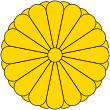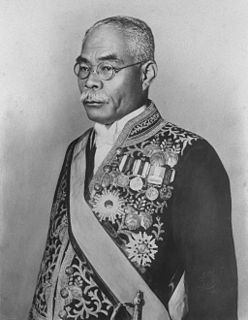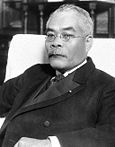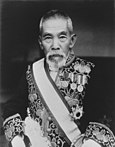
Anime is hand-drawn and computer animation originating from or associated with Japan.

The Battle of Okinawa, codenamed Operation Iceberg, was a major battle of the Pacific War fought on the island of Okinawa by United States Marine and Army forces against the Imperial Japanese Army. The initial invasion of Okinawa on April 1, 1945, was the largest amphibious assault in the Pacific Theater of World War II. The 82-day battle lasted from April 1 until June 22, 1945. After a long campaign of island hopping, the Allies were planning to use Kadena Air Base on the large island of Okinawa as a base for Operation Downfall, the planned invasion of the Japanese home islands, 340 mi (550 km) away.
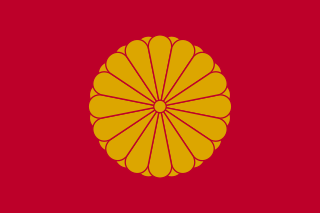
The Emperor of Japan is the head of the Imperial Family and the head of state of Japan. Under the 1947 constitution, he is defined as "the symbol of the State and of the unity of the people." Historically, he was also the highest authority of the Shinto religion. In Japanese, the Emperor is called Tennō (天皇), literally "heavenly sovereign". In English, the use of the term Mikado for the Emperor was once common, but is now considered obsolete.

Hirohito was the 124th Emperor of Japan according to the traditional order of succession, reigning from 25 December 1926, until his death on 7 January 1989. He was succeeded by his eldest son, Akihito. In Japan, reigning emperors are known simply as "the Emperor" and he is now referred to primarily by his posthumous name, Emperor Shōwa (昭和天皇). The word Shōwa (昭和) is the name of the era coinciding with the Emperor's reign, after which he is known according to a tradition dating to 1912. The name Hirohito means "abundant benevolence".

Japan is an island country in East Asia. Located in the Pacific Ocean, it lies off the eastern coast of the Asian continent and stretches from the Sea of Okhotsk in the north to the East China Sea and the Philippine Sea in the south.
Japanese is an East Asian language spoken by about 128 million people, primarily in Japan, where it is the national language. It is a member of the Japonic language family, and its relation to other languages, such as Korean, is debated. Japanese has been grouped with language families such as Ainu, Austroasiatic, and the now-discredited Altaic, but none of these proposals has gained widespread acceptance.

Manga are comics or graphic novels created in Japan or by creators in the Japanese language, conforming to a style developed in Japan in the late 19th century. They have a long and complex pre-history in earlier Japanese art.
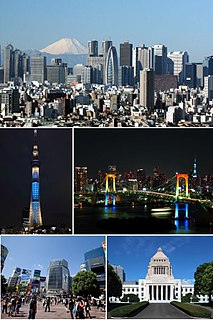
Tokyo, officially Tokyo Metropolis, one of the 47 prefectures of Japan, has served as the Japanese capital since 1869. As of 2018, the Greater Tokyo Area ranked as the most populous metropolitan area in the world. The urban area houses the seat of the Emperor of Japan, of the Japanese government and of the National Diet. Tokyo forms part of the Kantō region on the southeastern side of Japan's main island, Honshu, and includes the Izu Islands and Ogasawara Islands. Tokyo was formerly named Edo when Shōgun Tokugawa Ieyasu made the city his headquarters in 1603. It became the capital after Emperor Meiji moved his seat to the city from Kyoto in 1868; at that time Edo was renamed Tokyo. Tokyo Metropolis formed in 1943 from the merger of the former Tokyo Prefecture and the city of Tokyo. Tokyo is often referred to as a city but is officially known and governed as a "metropolitan prefecture", which differs from and combines elements of a city and a prefecture, a characteristic unique to Tokyo.
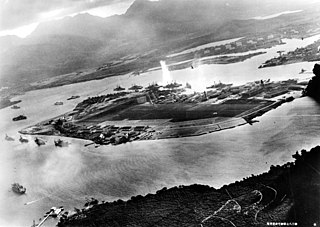
The attack on Pearl Harbor was a surprise military strike by the Imperial Japanese Navy Air Service upon the United States against the naval base at Pearl Harbor in Honolulu, Hawaii on Sunday morning, December 7, 1941. The attack led to the United States' formal entry into World War II the next day. The Japanese military leadership referred to the attack as the Hawaii Operation and Operation AI, and as Operation Z during its planning.

The Second Sino-Japanese War was a military conflict fought primarily between the Republic of China and the Empire of Japan from July 7, 1937, to September 2, 1945. It began with the Marco Polo Bridge Incident in 1937 in which a dispute between Japanese and Chinese troops escalated into a battle. Some sources in the modern People's Republic of China date the beginning of the war to the Japanese invasion of Manchuria in 1931.

The Empire of Japan was the historical nation-state and great power that existed from the Meiji Restoration in 1868 to the enactment of the 1947 constitution of modern Japan.

The Heisei period is the current era of Japan. The Heisei period started on 8 January 1989, the day after the death of the Emperor Hirohito, when his son, Akihito, acceded to the throne as the 125th Emperor. In accordance with Japanese customs, Hirohito was posthumously renamed "Emperor Shōwa" on 31 January 1989.
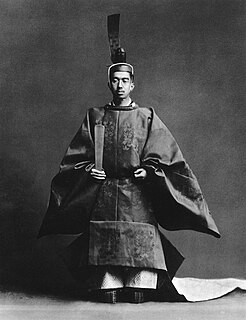
The Shōwa period, or Shōwa era, refers to the period of Japanese history corresponding to the reign of Emperor Shōwa (Hirohito) from December 25, 1926 until his death on January 7, 1989.

A cherry blossom is a flower of several trees of genus Prunus, particularly the Japanese cherry, Prunus serrulata, which is called sakura after the Japanese.

The Pacific War, sometimes called the Asia–Pacific War, was the theater of World War II that was fought in the Pacific and Asia. It was fought over a vast area that included the Pacific Ocean and islands, the South West Pacific, South-East Asia, and in China.

A music download is the digital transfer of music via the Internet into a device capable of decoding and playing it, such as a home computer, MP3 player or smartphone. This term encompasses both legal downloads and downloads of copyrighted material without permission or legal payment. According to a Nielsen report, downloadable music accounted for 55.9% of all music sales in the US in 2012. By the beginning of 2011, Apple's iTunes Store alone made US$1.1 billion of revenue in the first quarter of its fiscal year.

Fergal Devitt is an Irish professional wrestler signed to WWE, where he performs on the Raw brand under the ring name Finn Bálor where he is the current Intercontinental Champion in his second reign.

During the final stage of World War II, the United States detonated two nuclear weapons over the Japanese cities of Hiroshima and Nagasaki on August 6 and 9, 1945, respectively. The United States dropped the bombs after obtaining the consent of the United Kingdom, as required by the Quebec Agreement. The two bombings killed 129,000–226,000 people, most of whom were civilians. They remain the only use of nuclear weapons in the history of armed conflict.

Akihito is the current Emperor of Japan. He succeeded to the Chrysanthemum Throne upon the death of his father Emperor Shōwa (Hirohito) on 7 January 1989. According to Japan's traditional order of succession, he is the 125th member of the world's oldest reigning dynasty. The Japanese government announced in December 2017 that Akihito will abdicate on 30 April 2019 due to his age and declining health.

The Reiwa period will be the next era of Japan. The period is expected to start on 1 May 2019, the day when Emperor Akihito's elder son, Naruhito, is expected to ascend to the throne as the 126th Emperor of Japan. Emperor Akihito is expected to abdicate the Chrysanthemum Throne on 30 April 2019, marking the end of Heisei period. The year 2019 corresponds to Heisei 31 until 30 April, and Reiwa 1 from 1 May 2019.
